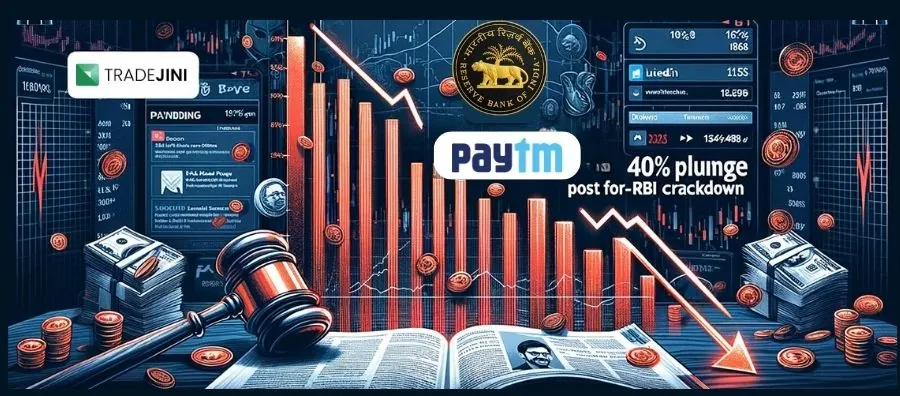The fintech giant Paytm, operated by One97 Communications, experienced a harrowing 40% slump in its stock price over two days, shaking investor confidence and spurring widespread market concern. This nosedive was triggered by the Reserve Bank of India's (RBI) decision to place stringent restrictions on Paytm's banking arm, Paytm Payments Bank Ltd (PPBL), citing significant regulatory lapses.
RBI's Clampdown on PayTM Payments Bank
On January 31, 2024, the RBI released a statement directing PPBL to halt certain operations due to "persistent non-compliances and continued material supervisory concerns," a move that blindsided both the company and the market. The central bank's sanctions included a prohibition on accepting new deposits and initiating credit transactions, effectively freezing a substantial part of the bank's operations from February 29, 2024.
The immediate market reaction was swift and severe. Paytm's shares took a nosedive, hitting the 20% lower circuit limit yesterday (Thursday, 1st February, 2024), as per market regulations that prevent a stock from moving beyond a particular range within a session. The following day (today) saw a continuation of this downward spiral, cumulatively eroding nearly 40% of the company's market value. The severity of the action suggests deep-rooted issues within PPBL's operational compliance, echoing a similar restriction from March 2022, where the bank was barred from onboarding new customers.
The financial figures paint a grim picture: Paytm's market cap, which stood robust at the time of its IPO, saw billions wiped out in market value. The volume of shares traded surged as investors scrambled to offload the stock, fearing further deterioration.
Paytm's Journey So Far on Dalal Street
Paytm's IPO, which launched in November 2021, was one of the most anticipated public offerings in India's corporate history. The company sought to raise approximately INR 18,300 crores ($2.5 billion) at a price band of INR 2,080 to INR 2,150 per share, valuing the company at nearly INR 1.39 lakh crore ($18.7 billion). The offering was met with a lukewarm response from retail investors, with the IPO subscribed only 1.89 times, significantly lower than other tech IPOs of the era.
On listing day, the stock opened at a discount, marking a disappointing debut as shares tumbled 27% from the IPO price. This lackluster performance continued as market sentiments remained cautious about Paytm's long-term profitability and regulatory challenges. Despite the broader market's skepticism, Paytm's stock found intermittent support from its growth prospects in the burgeoning digital payments space, with the company reporting a customer base of over 350 million and a merchant base of over 21 million.
However, these growth figures did not translate into immediate profitability, as reflected in the company's quarterly reports. Investors, initially captivated by the potential of a fintech revolution in India, began to reassess the risks associated with the company's aggressive expansion and the financial sector's regulatory environment.
Post-IPO Performance
After its historic IPO, Paytm’s stock struggled to maintain momentum. The initial decline, which saw the shares trading at a significant discount on the first day, set a precedent for future volatility. Despite the market's initial cold shoulder, Paytm managed to generate some upward movement in the subsequent months, buoyed by optimistic projections about the digital payments industry's growth trajectory in India.
However, the company faced headwinds as it navigated through operational losses. For instance, the quarter ending December 2021 saw a loss of approximately INR 778 crores, an increase from the INR 435 crores loss reported in the same quarter the previous year. These figures were concerning for investors who were looking for signs of a turnaround in profitability.
The company's stock saw a temporary respite when it reported a reduction in losses and an uptick in revenue, with the total income for the quarter ending December 2022 rising by about 89% year-on-year. Yet, despite these glimpses of hope, the shares remained well below the IPO level, indicating the market's cautious stance on the stock’s real value.
Regaining Momentum
Paytm's shares witnessed sporadic bursts of momentum post-IPO, driven by various factors including strategic partnerships, entry into new business verticals, and positive news flow around the digital economy's growth. One such example was the expansion into financial services, which showed promise with a reported increase in disbursements by 334% year-on-year for the quarter ending December 2022.
The stock was also buoyed by the broader market rally, which saw technology stocks gaining favor among investors. Paytm benefited from this sentiment, with its stock price seeing brief periods of recovery. However, these gains were often short-lived as the company continued to be weighed down by concerns over its path to profitability and the broader regulatory landscape that was becoming increasingly stringent.
The fluctuations in Paytm's stock were reflective of the broader sentiment in the market, where investors were beginning to question the valuations of technology companies, especially those that had not demonstrated a clear route to profitability. The regulatory concerns that had started to surface posed an additional risk, leading to a more significant impact on the stock's performance.
Losing Investors’ Confidence
The precipitous fall of Paytm's stock over the course of two days can be largely attributed to the RBI's restrictive actions on PPBL. This punitive measure resonated with a jittery investor base, leading to a massive sell-off. The 40% nosedive is a telling indicator of the market's skittishness over regulatory risks and the potential for fundamental disruptions to Paytm's business model.
The RBI's crackdown could not have come at a worse time. Following the initial post-IPO slump, Paytm had begun to show signs of recovery, buoyed by growth in its financial services arm and an increasing transaction volume on its platforms. However, the RBI's announcement raised alarms about potential systemic issues within the company, overshadowing previous gains.
Paytm's Response
In response to the RBI's action, Paytm assured investors and customers of its intent to comply with all regulatory requirements. The company highlighted its robust financial position to handle customer withdrawals and its commitment to transparent operations. Paytm's management also sought to reassure stakeholders by outlining a roadmap to mitigate the impact of the RBI's sanctions and navigate the path forward.
To address the immediate fallout, Paytm is likely to expedite the transition of its wallet services to other banking partners, ensuring minimal disruption to its user base. The company has emphasized its diverse portfolio of services, suggesting that while the payments bank is a crucial component, its broader ecosystem remains intact and operational.
Broader Impact
The repercussions of the RBI's intervention extend beyond Paytm. It sends a strong signal to the burgeoning fintech sector about the importance of regulatory compliance. The incident may prompt other players in the industry to reevaluate their operational practices and align more closely with regulatory expectations.
For the market, the event highlights the volatility and risks associated with investing in high-growth but unprofitable tech companies. It serves as a stark reminder of the importance of due diligence and the potential for regulatory actions to affect the market's perception of a company's value.
Paytm's dramatic stock plunge following the RBI's decision has been a wake-up call for investors and the fintech industry alike. As the company navigates these choppy waters, the eyes of the world will be on how it steadies the ship and what this means for the future of digital banking in India. The story of Paytm's rise, fall, and the struggle for recovery is far from over, but it is already providing valuable lessons for the fintech sector and its stakeholders.
PayTM stock was trading at Rs 487.20 on Friday.



